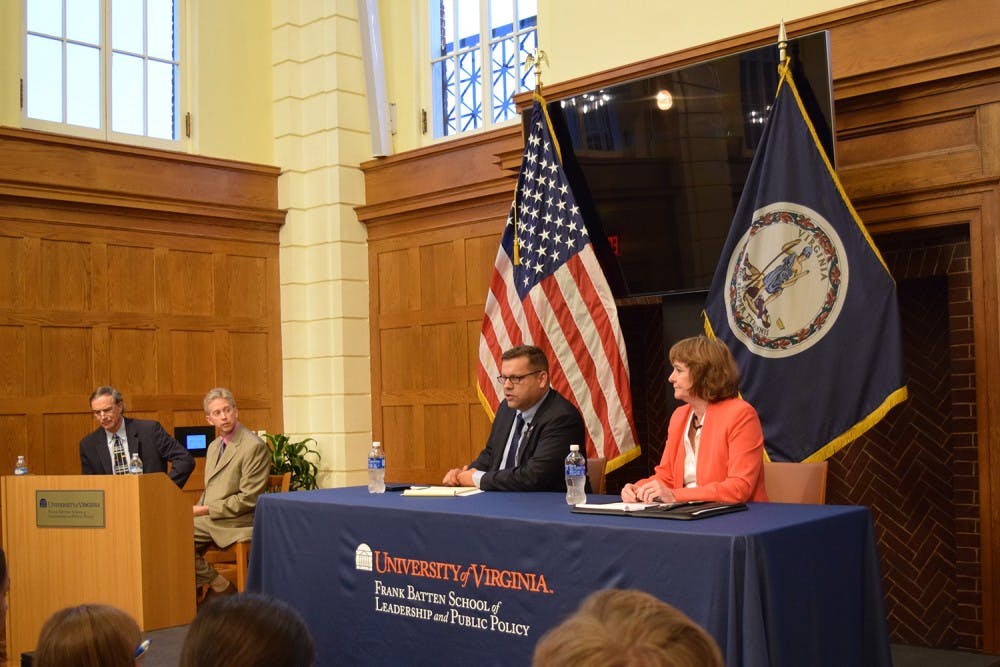The Batten School hosted a debate Wednesday night between candidates running for Virginia's fifth congressional district.
Democrat Jane Dittmar, a former chair of the Albemarle County Board of Supervisors, and Republican Tom Garrett, a Virginia State Senator, attended the debate.
Batten Dean Allan C. Stam and Prof. Gerald Warburg moderated the debate and asked questions regarding domestic and foreign policy.
Dittmar and Garrett were asked about the role of state and federal government support for public universities.
“If you were to try to track the number of amazing things that get done at places like the University of Virginia by virtue of the investment of federal and state-backed scholars, you’d spend the rest of your life doing it,” Garrett said.
He said he believes universities should have a mission to train leaders in order to establish a world-class economy that works long-term, and at both the state and federal level.
Dittmar spoke about the underfunding of higher education and the disadvantages it could create in the future.
“We’re just lucky that we have institutions that have their own fundraising abilities,” Dittmar said. “We need to keep up, make sure our state senators and our delegates know this. I think that one of the things that is abysmal is the way they’ve allowed tuition to rise — we’re trying to educate people here for our future and future generations.”
The second portion of the debate involved questions from the audience.
Audience members asked the candidates about their plans to make college more affordable and accessible.
“When the federal government in the name of fairness said we’re going to go at the student loans industry to make sure that any person, with any money, can study anything for any amount of time, they created essentially an arms race between universities,” Garrett said. “They’re competing for a limited pool of talented students.”
Instead of this, he suggested recognizing “the ability of individuals to repay loans based on what they might choose to study.”
Garrett also advocated a “Student Security” plan developed by University alumnus Elliot Harding. The program would allow student loans to be forgiven in exchange for the graduate's voluntary deferring of Social Security benefits for up to 10 years.
Dittmar shared an anecdote of a woman she knows in Albemarle County who took on a second job to pay her student loans.
“She pays six and three quarters percent interest — mortgages now are around three and a quarter, three and three quarters. It’s just not right,” Dittmar said.
Dittmar suggested creating a program similar to the G.I. Bill for supporting higher education.
“What we need to do is look at what [Garrett] did, he served our country and then went to school on the G.I. Bill,” Dittmar said. “We need to have a civilian equivalent to that. We need to look at the numbers and how that would work. If you’re willing to serve your country and then go to college without debt, if you’re willing to go into debt and then serve in particular areas after to have it taken away, I think that’s the way our country needs to go.”
In an interview with The Cavalier Daily, Garrett stressed Student Security.
“There is a real, looming, dark cloud when you graduate,” Garrett said. “You’re a good student, you’re a smart person, you’re here [at UVa]. And everybody here is, but nobody’s getting a small business loan when they’ve got $100,000 in debt. Nobody’s buying a car when they’re got that much debt, nobody’s buying a house,and that’s hurting our economy.”
The program is about choice, Garrett said.
“What we’re doing is not forcing anybody to do anything, but letting students make a decision for themselves — and I think that’s what America’s all about,” Garrett said.
Dittmar told The Cavalier Daily she wants students to understand her engagement with the University’s community, both in the past and present.
“I think that one of the things that I wanted to do was stay near the University when I graduated… that’s what that job creation is all about,” Dittmar said, referencing her priority to create jobs in the district. “What we want to do is make sure that our great students and intellects move out and maybe even come to Washington to help us change it up and move our nation forward.”
Dittmar was part of the fourth class at the University that included women, and has a daughter currently in her fourth year. Garrett grew up about 20 minutes from Grounds.
The candidates emphasized the importance of voting in the upcoming election.
“It is so important to vote in November,” Dittmar said. “This should be the first presidential election for many students, and so this would be an exciting time for them to help put their footprint on the future of the country.”
Correction: This article previously described the Student Security plan as a debt deferment plan.







